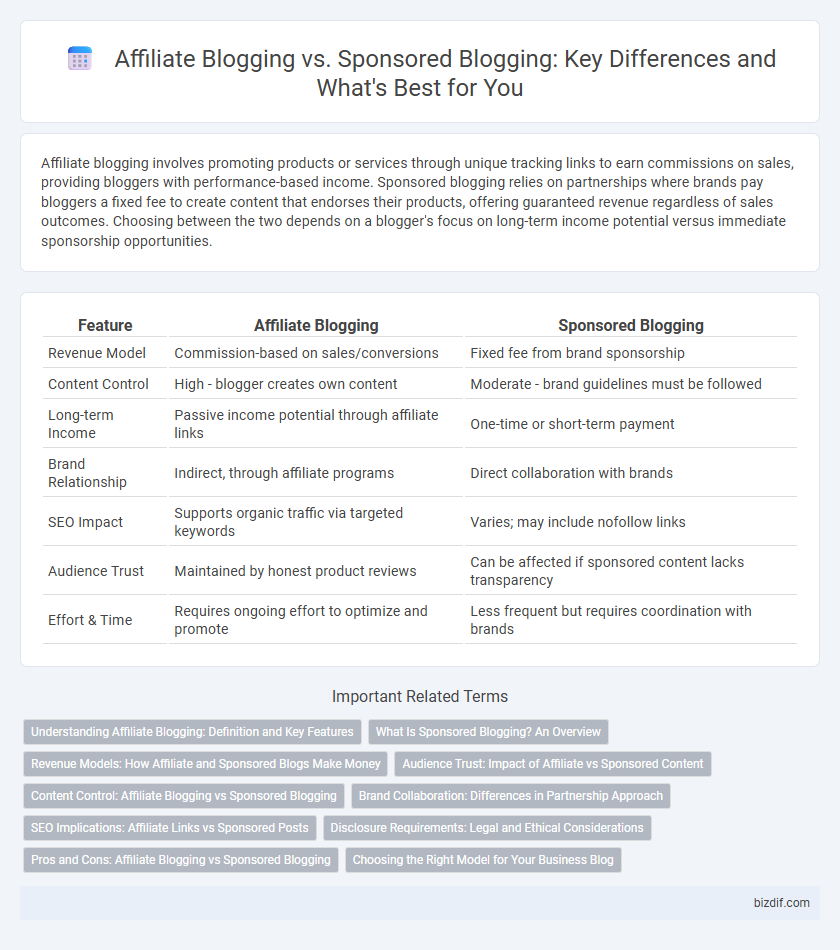Affiliate blogging involves promoting products or services through unique tracking links to earn commissions on sales, providing bloggers with performance-based income. Sponsored blogging relies on partnerships where brands pay bloggers a fixed fee to create content that endorses their products, offering guaranteed revenue regardless of sales outcomes. Choosing between the two depends on a blogger's focus on long-term income potential versus immediate sponsorship opportunities.
Table of Comparison
| Feature | Affiliate Blogging | Sponsored Blogging |
|---|---|---|
| Revenue Model | Commission-based on sales/conversions | Fixed fee from brand sponsorship |
| Content Control | High - blogger creates own content | Moderate - brand guidelines must be followed |
| Long-term Income | Passive income potential through affiliate links | One-time or short-term payment |
| Brand Relationship | Indirect, through affiliate programs | Direct collaboration with brands |
| SEO Impact | Supports organic traffic via targeted keywords | Varies; may include nofollow links |
| Audience Trust | Maintained by honest product reviews | Can be affected if sponsored content lacks transparency |
| Effort & Time | Requires ongoing effort to optimize and promote | Less frequent but requires coordination with brands |
Understanding Affiliate Blogging: Definition and Key Features
Affiliate blogging involves promoting products or services through unique affiliate links that track sales or leads generated by the blogger. Key features include earning commissions based on performance, content-driven marketing, and transparency with audiences about affiliate relationships. This model emphasizes trust-building through honest reviews and targeted content to drive conversions effectively.
What Is Sponsored Blogging? An Overview
Sponsored blogging involves creating content that is funded by a brand or company in exchange for promotion or exposure. This form of blogging typically features product reviews, brand mentions, or dedicated posts that align with the sponsor's marketing goals. Sponsored bloggers often disclose their partnerships to maintain transparency and comply with advertising regulations.
Revenue Models: How Affiliate and Sponsored Blogs Make Money
Affiliate blogging generates revenue through commission-based sales, where bloggers earn a percentage of each purchase made via their unique affiliate links. Sponsored blogging relies on direct payments from brands for content promotion, often featuring pre-negotiated fees for posts or campaigns. Both models capitalize on content-driven monetization but differ in payout structure and advertiser relationship dynamics.
Audience Trust: Impact of Affiliate vs Sponsored Content
Affiliate blogging fosters audience trust through transparent product recommendations backed by personal experience, creating authentic connections that drive conversions. Sponsored blogging can risk audience skepticism if promotional content appears overly commercial or biased, potentially diminishing credibility. Maintaining clear disclosure and genuine content is essential for preserving trust in both affiliate and sponsored blogging models.
Content Control: Affiliate Blogging vs Sponsored Blogging
Affiliate blogging offers greater content control as bloggers can choose products and craft authentic reviews that align with their voice, enhancing trust with their audience. Sponsored blogging typically involves brand guidelines and pre-approved messaging, limiting creative freedom but providing structured promotional content. Control over content in affiliate blogging supports personalized engagement, while sponsored blogging prioritizes brand consistency.
Brand Collaboration: Differences in Partnership Approach
Affiliate blogging involves promoting products through unique tracking links, earning commissions based on sales, which requires a performance-driven partnership. Sponsored blogging features direct payment for content creation or product placement, emphasizing brand messaging control and fixed compensation. Brands in affiliate partnerships prioritize ROI through measurable sales, while sponsored collaborations focus on brand awareness and audience engagement.
SEO Implications: Affiliate Links vs Sponsored Posts
Affiliate blogging often enhances SEO through strategic use of high-quality affiliate links that drive traffic and improve domain authority, whereas sponsored blogging may involve nofollow or sponsored attributes on links, limiting direct SEO benefits but increasing brand exposure. Clear disclosure and relevance of affiliate links are crucial for maintaining search engine trust and avoiding penalties, while sponsored posts require careful integration to preserve content quality and user experience. Search engines prioritize natural link profiles, making organic affiliate links more valuable for long-term SEO compared to frequently used sponsored post links.
Disclosure Requirements: Legal and Ethical Considerations
Affiliate blogging requires clear disclosure of affiliate links, complying with Federal Trade Commission (FTC) guidelines to maintain transparency and avoid legal penalties. Sponsored blogging mandates explicit identification of paid partnerships to uphold ethical standards and inform readers of potential biases. Ignoring disclosure requirements in either type risks damaging credibility and violating advertising regulations.
Pros and Cons: Affiliate Blogging vs Sponsored Blogging
Affiliate blogging generates revenue through product commissions, offering passive income potential but requiring consistent traffic and trust-building to succeed. Sponsored blogging provides upfront payment and brand partnerships, ensuring immediate income yet often limiting creative control and long-term scalability. Balancing affiliate marketing's performance-based earnings against the predictable cash flow of sponsored content is essential for maximizing blog profitability.
Choosing the Right Model for Your Business Blog
Affiliate blogging generates revenue through promoting products or services using unique tracking links, earning commissions on sales driven by the blog. Sponsored blogging involves collaborating with brands to create content in exchange for fixed payments, emphasizing brand exposure rather than direct sales. Selecting the right model depends on your blog's niche, audience engagement, and long-term monetization goals to maximize profitability and maintain authenticity.
Affiliate Blogging vs Sponsored Blogging Infographic

 bizdif.com
bizdif.com